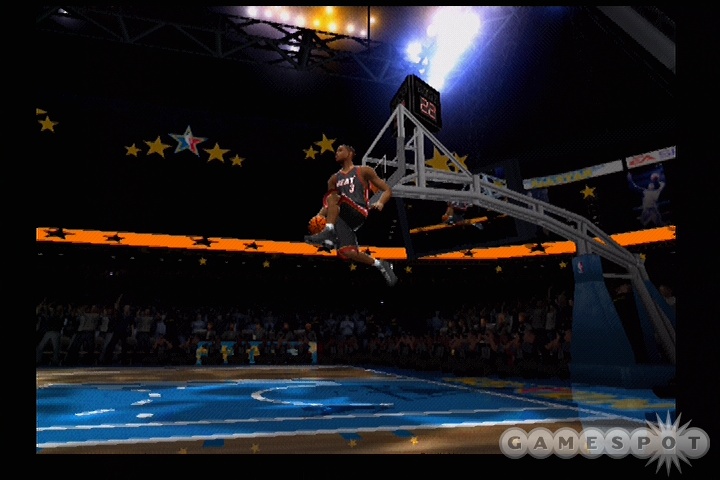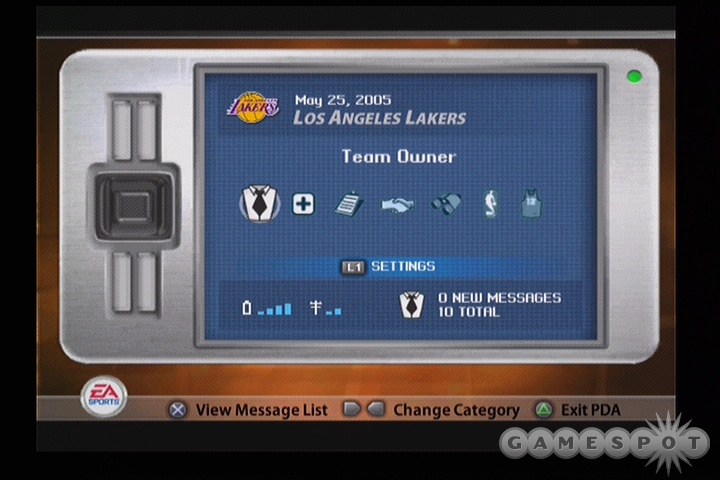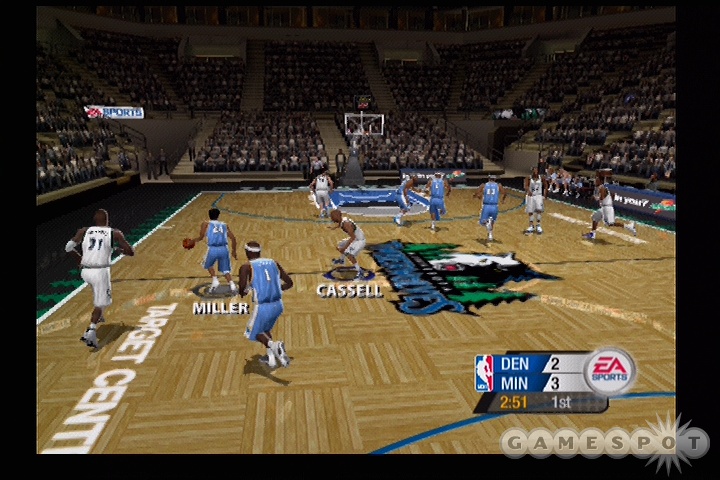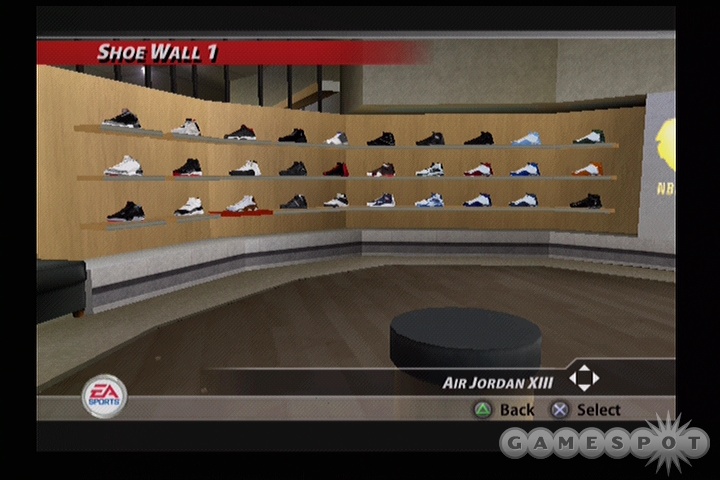NBA training camps haven't even opened yet, but that hasn't stopped Electronic Arts from shipping the latest iteration of its NBA basketball franchise, NBA Live 2005. Live 2005 offers a number of new features, such as a full implementation of all-star weekend, complete with the slam-dunk contest and three-point shootout. There's also been a revamp of the franchise mode and some tweaks made to the basic gameplay. But, as with an NBA team, a game is not just the sum of its parts. NBA Live 2005 plays a solid game of basketball, but even the flashy new features can't hide the fact that it isn't a huge step up from last year's edition.

The biggest addition in NBA Live 2005 is its inclusion of the all-star weekend. You'll be able to play through four events from the real-life NBA All-Star weekend, including the rookies vs. sophomores game, the actual all-star game, the three-point shootout, and the slam-dunk contest. The three-point contest allows you to pick up to eight NBA sharpshooters to compete against each other. Each player must take up to 25 three-point shots within 60 seconds to earn points, with five specially colored balls counting for two points instead of one. In practice, this mode really isn't that exciting, as it boils down to pressing the same two buttons over and over again.
The dunk competition is more interesting. In this mode, the buttons on the controller are remapped. Each of the four face buttons corresponds to a different type of takeoff, such as one-footed takeoffs or 360-spin takeoffs. After you move toward the basket and jump, you can press one of the face buttons again in midair to execute one of a host of different tricks, such as a double clutch, a tomahawk, and so on. During each of these two phases, you can press one or two different shoulder buttons to slightly modify the move your player is executing. Since the moves are contextual depending on your position relative to the basket, there are dozens or even hundreds of possible dunks. Combine these moves with the different optional tosses you can execute before your takeoff, and there are even more possible permutations. Not all the dunks are entirely realistic--it's theoretically possible to have your player kick the ball off the shot clock, do a running cartwheel, catch the ball in the midst of a 360 spin, switch hands between his legs, and then throw the ball down. It's physically impossible even for Tracy McGrady to do such a thing in real life, but you can do it in NBA Live 2005's dunk mode. And if you expect to get a high score from the panel of five NBA legends (George "Iceman" Gervin and Clyde "The Glide" Drexler among them) who judge the dunk contest, your dunks better be outrageous enough to straddle the line between fantasy and reality.
So is it any fun? That all depends on your idea of fun. Getting the timing down to perform the more complicated dunks is quite difficult. Even executing a "simple" toss off the backboard and catching it for a standard dunk (à la Tracy McGrady in the 2002 All-Star game) requires a lot of practice. Those who do have the tenacity to learn complicated dunks will find that performing them is pretty satisfying, and thankfully a practice mode is included. But in the end, a lot of folks will probably mess around with the dunk mode a little bit, get frustrated, and forget about the mode entirely.
Live 2005 also offers a completely revamped dynasty mode. The schedule of games and important events (such as the draft and the all-star weekend) is now displayed on a color-coded calendar interface. As you simulate a season, you can examine full box scores from the previous day's games. The scores of your own team's games are shown quarter by quarter as they're played, and you're allowed to jump in and intervene at any point. This is useful if you see the game slipping away from your team in an important divisional matchup, as you can simply jump into the game in progress and play out the rest of it yourself to ensure victory. You're updated on important events, such as injuries, major player transactions, and other news via a PDA, which will beep whenever you have a new message.

As general manager, you'll also need to manage your team's staff of scouts throughout the year. Much like in NCAA Football 2005's recruiting mode, you can scout out rookie prospects for the upcoming draft. The initial batch of players can be sorted by region, or by their rough quality ratings. By spending dynasty points to scout, you'll be able to get more-accurate stats on each of the players, giving you the information you need for the draft. The best part is that a week before the draft, you can invite players to come in for a workout with your team, and actually play as them in a one-on-one game against one of your own players. This hands-on test-drive is a great way to get a feel for your rookie prospects.
There are some annoying issues with the dynasty mode, however. The biggest of these is the inability to set an overarching team strategy for games. While managing the new-look Lakers, for example, we were looking for a way to have the team run at an up-tempo pace, to take advantage of their new athleticism and minimize their weakness in the low post with Shaquille O'Neal gone. Unfortunately, there seem to be no such options for team strategy, which is a major omission. Another irritant is that the PDA buzzer goes off almost constantly as you're simulating your way through the season. You'll feel compelled to stop simulating to check your e-mail, only to find that 90 percent of the time it's an unimportant message. But if you don't check your mail every time, you'll invariably miss something important, such as a note from your medical staff that your star player has suffered serious injury.
Aside from the face-lift to the dynasty mode, there have been some tweaks made to the actual gameplay. The most notable of these is the "freestyle air" feature, which allows you to double-tap the dunk button in midair to change your shot. If you go up for a dunk and see a defender coming over to challenge, you can double-tap and change your shot to avoid getting blocked. You're also given new choices for hitting the offensive glass. Now, instead of the computer deciding when your player tries for a tip dunk, tip-in, or rebound, you can manually try for any of these three options by pressing a different button. As in real life, tip dunks are rare but satisfying, and tip-ins can sometimes be executed in situations where grabbing the rebound outright would be impossible.

The developers have also made adjustments in other areas. New entry-pass animations have been added, so you'll see guards lobbing balls into the low block, or sometimes using a bounce pass to get the ball past a defender. You'll also see new scoop layup and dunk animations around the basket, allowing the more athletic players to fluidly score even when they're pinned behind the backboard or standing directly underneath the basket. The "pro hop" function has been weakened as well, perhaps too much so. Last year, executing the pro hop would push defenders back, often leading to a free dunk. This time around, using the pro hop on a defender will result in an offensive foul, or the ball handler losing control of the ball. In fact, it seems as if it's almost impossible to safely execute a jump stop in traffic at all, making it seem all but useless in NBA Live 2005. Finally, freestyle dribbling (using the right analog stick) is now effective only when playing as a guard or a small forward. If you try to execute fancy moves with a clumsy power forward or center, you can expect to lose the ball immediately. Sorry, Dallas Mavericks fans--no more killer crossovers with 7'6" Shawn Bradley.
Unfortunately, many of the annoying flaws in previous Live games pop up in Live 2005. Players still have a strange "force field" around them, which makes it easier to stay in front of players, but can result in some cheap out-of-bounds calls as you "push" the ball handler toward the sideline or baseline. Players still stop to catch passes, instead of continuing to run, so don't expect many real fast breaks off outlet passes or steals. This is doubly troublesome because defenders seem to recover much too quickly when they're beaten, especially at higher difficulty levels. And when you do manage to get out on a fast break, with teammates on your flanks, you'll find that they never finish running toward the basket as they should. Instead, they always pull up at the wing right around the three-point line, which is the opposite of fundamentally sound basketball.
As far as control is concerned, the PlayStation 2 version of the game stands out as the best, because the button layout of the controller makes it easy to access all the critical buttons. The Xbox is a close second, with only the alley-oop function (mapped to the somewhat hard-to-reach white button) being somewhat difficult to use. The GameCube layout is easily the worst of the three, as the button layout on that controller makes it difficult to pull off even simple maneuvers like a jump hook. What's more, the Z button is mapped to two different functions, which can be confusing.
Graphically, NBA Live 2005 isn't a whole lot different from last year's game. The game looks very good on all three platforms in the three-point and slam-dunk competition modes, and features some extremely detailed player models. However, there's a noticeable drop-off for the PlayStation 2 and GameCube editions when you play a regular five-on-five game, with a big decrease in player-model detail and much flatter lighting. The Xbox version doesn't see nearly as steep of a drop-off in the regular gameplay modes, and as a result, it's by far the best looking of the three console versions of the game.
Like last year's edition, NBA Live 2005 features excellent sound. You'll hear crowds cheer and jeer the action on the court, along with the sounds of sneakers squeaking and the ball bouncing on the floor. Rim-rocking dunks sound appropriately powerful, while soft jump shots produce a subdued swish. The celebrated duo of Marv Albert and Mike Fratello make a return in NBA Live 2005, giving the game great play-by-play and color commentary. New to the broadcast team are TNT's Ernie Johnson and Kenny "The Jet" Smith, who handle the announcing during the all-star weekend for the dunk contest and the three-point shootout. Like Albert and Fratello, they are immediately familiar and likable to most NBA fans, and their more playful and familiar style provides a nice change of pace. There's also a collection of hip-hop tunes from EA Trax, which aren't quite as good as last year's but still fit the basketball theme well.

Both the PlayStation 2 and Xbox versions of the game ship with online functionality. You can expect the usual array of features: ranked ladders, lobbies, news, and chat, as well as updated sports scores and messaging through EA messenger. As far as online stability goes, our tests produced mixed results on both platforms. In some games we experienced very noticeable latency, with choppy frame rates and players seeming to stutter and teleport through their animations. Other games played out much more smoothly. This inconsistency was present even before the servers opened up to the public, leading us to wonder how well the servers will handle the load once players begin to fill the servers.
For better or worse, the dunk contest is the centerpiece of the NBA Live 2005's new features, and certainly it's a much better implementation of a similar mode in ESPN College Hoops 2K4. But it's tough for us to say that the dunk mode really adds a lot of value to the franchise, and it's also likely to prove too difficult for most casual players to fully grasp anyway. Beyond the new implementation of the all-star weekend, longtime players of the Live series will enjoy the revamped franchise mode, as well as the incremental tweaks to the basic gameplay, although both aspects of the game still have noticeable flaws. All things considered, NBA Live 2005 is a very good basketball game but doesn't advance the franchise as much as we would have hoped.